
Water Is Life, and Life is Precious
September 15th, 2015
“The precious commodity.”
This is how local journalists often characterize that element, which is a pretty small component of Planet Earth but which makes up a large percentage of the physical makeup of our own bodies. I am talking about water. Here are a few examples of how water (or the lack of it) is affecting Jamaicans’ livelihoods, their security, and most importantly – their health.
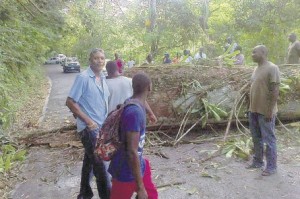
A really large tree blocking the road in Dressikie, St. Mary in 2013, during a protest. Residents, cutting trees will not help the situation – you are destroying the watershed!
The citizens of St. Mary are furious. Last week there were almost daily roadblocks in the parish, all protesting the lack of water. Well, this is nothing new, you might say. In fact, St. Mary held numerous protests last year, during the summer-long drought. Trees are often felled to block roads, which firemen have to cut with saws (protesters, please do not cut down trees! This will only make the situation worse!) Roads are damaged and burning blockades harm the atmosphere. Motorists delayed by roadblocks cannot reach their place of work or study. Production is hampered. At some point, if protests escalate, there is a real danger to national security.
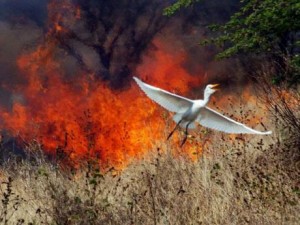
An egret flies from a large bush fire near Municipal Boulevard in Portmore, St Catherine. (Photo: Gleaner)
You see, when there is a dire shortage of water there are lots of little spinoff effects in many areas of life. Bush fires caused by the drought (many of which were left to burn themselves out) have resulted in cable, telephone and internet wires being destroyed in hilly areas, where there are guest houses and other small businesses. Those enterprises (and homes) are now cut off, many awaiting reconnection. Again, production is hampered.
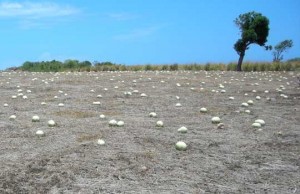
This photograph shows a melon farm in southern St. Elizabeth, Jamaica destroyed by drought in 2011. Of all the challenges farmers in the region face, including crippling storms and floods, drought poses the greatest. In spite of watering and tending his field for weeks, this farmer lost his entire crop. (Courtesy D. Campbell/Earthdata)
So, a lack of water stymies economic development. The obvious impact is on the agricultural sector. The sight of hard-working farmers in St. Elizabeth, Manchester – close to tears in a field full of dried-up melons and dead vegetables – is truly painful. This is their entire investment – their livelihood – destroyed. Is proper insurance for farmers available? They desperately need financial assistance, at least until the rains come and until they can restock and revive their fields.
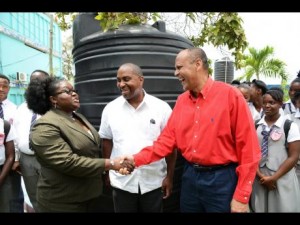
The private sector has played its part in helping schools with water shortages. Here, the President of Guardian Life presents a water tank to Hazel Cameron, principal of Clan Carthy High School while Julian Robinson(centre) and students look on. Guardian Life has donated a total of fifteen 1000-gallon water tanks to 15 schools in Kingston and St Andrew to ease water storage during drought. Digicel and other firms have also donated water tanks. (Photo: Gleaner)
The pressure on institutions is enormous. At the end of the long summer vacation, it transpired that a number of schools were going to be facing “water challenges.” The worst affected – around 200 schools – received water tanks a few days before school opened (and hopefully water was provided to fill those tanks). Some schools do practice rainwater harvesting (although many areas are still not experiencing rain). Already I am hearing of students being sent home early. How are hospitals managing? They are supposed to be priority recipients of water, but are they able to function normally?
And at home? A friend of mine has a sky-high electricity bill now, because he has to pump water. People are late for work, because it takes them longer to wash and prepare for the workday. One inner-city resident said she now has to visit her neighbors’ houses, begging half a bottle of water to drink; many Jamaicans simply cannot afford to buy expensive bottled water every day. As is often the case, many rural (and even urban) dwellers have to walk miles to get water, or pay thousands of dollars they can ill afford for it to be trucked to their homes. Again, there is the economic impact of all this.
Perhaps my major concern, however, is public health. Is the trucked water clean and suitable for drinking, and are those who buy from them advised accordingly? Where does the water come from? An alarming television report showing a decrepit looking truck siphoning water out of the Fresh River (a misnomer – it is polluted) for a hotel. Are the trucks and the hoses clean? Many appear to be very dirty. It frightens me.
Bearing all of the above in mind – the ongoing, persistent stress of water shortages – what is the Ministry of Water, Land, Environment and Climate Change doing to ease the pressure in the short term? What is the Ministry putting in place for the long term? Numerous ideas have been put forward, and many since rejected as impractical, too expensive (desalination) or ineffective (de-silting the reservoirs). Some possible solutions discussed during last year’s drought seem to have been jettisoned this year. It is wonderful to hear that the water policy is being revised, to ensure clean water for all; how does this help us now?
At least the Jamaican man/woman on the street is learning, and learning fast. We all have to work out survival strategies. Our home is filled with plastic bottles (all of this will add to more solid waste, of course). Everyone tries in their way to conserve; everyone gets angry when they see a burst pipe disgorging gallons per minute onto a roadway. We hope for happier days; but this may well be the way of the future.
What am I looking for? I would like to see regular updates from the Ministry of YouKnowWhat on its short term plans (more expensive trucking?) and the progress of its long term plans, so that this will never happen again. It is a pity that the Minister in question also chairs the ruling political party, and it is election time. One senses he is quite distracted by internal party affairs. We do need transparency – and information. For example, if there is a fire (and there have been literally thousands, this summer) are any fire hydrants in working order? Is it even worth calling our beleaguered Jamaica Fire Brigade?
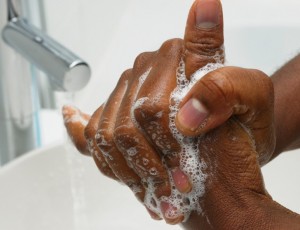
Now there is much less water, are people washing their hands properly, especially food handlers? We need a much more visible public education campaign on this.
I am, in particular, astonished that the Ministry of Health has not seen fit to issue regular public advisories on the importance of washing hands, drinking clean water, cooking with water, dangers of dehydration, etc. – simple guidelines. Or are we waiting for an outbreak of infectious disease? We cannot be careless about these matters. Minister, social media is free, and effective. Get those messages out!
We know the meaning of the Taino/Arawak name for Jamaica: Xaymaca. “What happened to the Land of Wood and Water?” a taxi driver asked me this morning. That’s a good question. I don’t believe Jamaica will ever return to the halcyon days of the Arawaks. Let’s get used to it.
Well, it rained yesterday. We enjoyed the thrill of thunder, crackling lightning – and rain! Let’s not get too excited, though. Climate change is here, and here to stay, as our Minister is fond of telling us.
We had better get used to that idea, too.
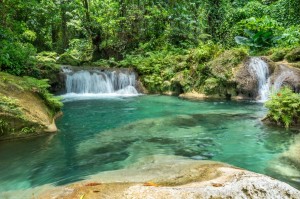
Reach Falls in Portland: Will scenes like this be a thing of the past? (Photo: hotelmockingbirdhill.com)
Tags: Arawaks, civil unrest, Climate Change, drought, farmers, Jamaica, Manchester, Ministry of Health, Ministry of Water Land Environment Climate Change, protests, public health, social media, St. Elizabeth, St. Mary, sustainable development, Taino, water resource management
The Gleaner reserves the right not to publish comments that may be deemed libelous, derogatory or indecent.
To respond to The Gleaner please use the feedback form.
6 Responses to “Water Is Life, and Life is Precious”
- We Are the Zoomers
- Living Online with Humans and Birds: NAOC 2020
- Human Trafficking and the Problem of Public Education
- Down Memory Lane
- Are We Ready to Recover from COVID-19?
- Road Safety Matters: Is Your Vehicle Safe?
- Sexual Harassment, Me Too, and the Minister’s Disturbing Giggle
- The Vulnerable Senior Citizens, Private Care Homes and COVID-19
- A Muddle Over Masks
- Here is Something Life-Saving You Can Do: Give Blood!

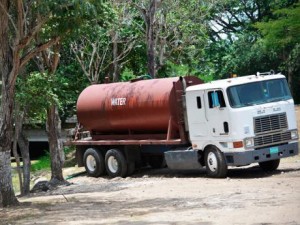


WOW, this truly puts into context, the everyday – real life – economic and health cost of this water shortage/drought; and I think underscores the negligence that this issue has been treated with. Thanks for this.
[…] I discuss this in my latest blog post on the Gleaner blogs page. Here is the link: http://gleanerblogs.com/socialimpact/?p=2922 “Water is Life, and Life is Precious.” I hear that some schools are struggling with […]
This is why government and other leaders must never say we need to choose between environment and development! We can’t have development without a healthy environment and the water, food and security it provides. This drought and our unpreparedness for it is costing Jamaica time, money, property and lives! This article drives home how water is fundamental to our well-being as individuals, communities and a nation. It also makes it clear that proper management of water resources and watersheds is not a problem for the ‘environmentalists’ to solve. It’s a social, economic and health issue that affects everybody.
Thanks for your comments, Damien. Yes, it seems to me that there are so many small, hidden stresses and problems arising from water shortages. They have not been fully explored – or addressed.
Kimberly, I could not agree with you more. The “environment vs development” argument is a false dichotomy, if that is the right word. The two elements have to be one and the same, or at least hand in hand. Thank you very much for your kind comments. I appreciate it!
[…] perhaps with an inkling of what was to come I warned of this in my recent Gleaner blog, here: http://gleanerblogs.com/socialimpact/?p=2922 I questioned why the Ministry of Health had not rolled out a public education campaign (weeks ago) […]